英语词汇讲座讲义
- 格式:ppt
- 大小:4.23 MB
- 文档页数:158

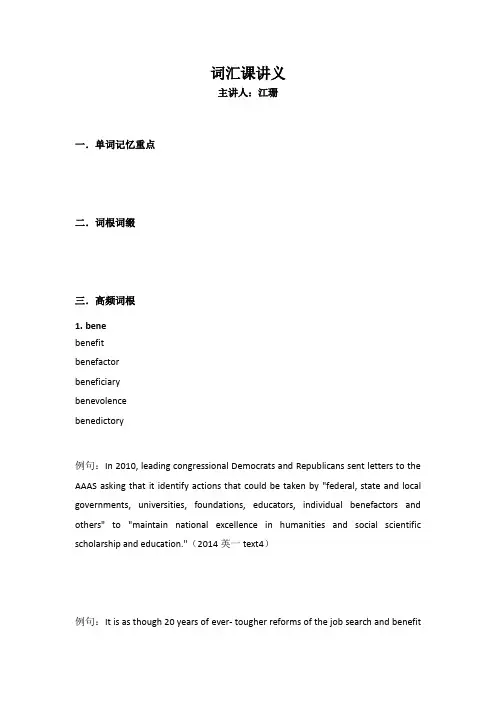
词汇课讲义主讲人:江珊一.单词记忆重点二.词根词缀三.高频词根1.benebenefitbenefactorbeneficiarybenevolencebenedictory例句:In 2010, leading congressional Democrats and Republicans sent letters to the AAAS asking that it identify actions that could be taken by "federal, state and local governments, universities, foundations, educators, individual benefactors and others" to "maintain national excellence in humanities and social scientific scholarship and education."(2014英一text4)例句:It is as though 20 years of ever- tougher reforms of the job search and benefitadministration system never happened. (14英一text1)2.facfactfactualfactorfactorybenefactorfacilefacilitatefacilityartifactmanufacturefactitiousfaculty例题:As time went by, computers became smaller and more powerful, and they became “personal” too, as well as ___13___ , with display becoming sharper and storage ___14___ increasing. (2002英一完型)A. abilityB.capabilityC. capacityD. faculty例句:Sunjunkie, which manufactures its own brand of self-tanning products, as well as making it for high street retailers, has been struggling to source the solvent because of disruption in the global supply chain . 《卫报2011年11月刊》3.fecaffecteffectineffectivenessaffectionaffectionateefficientdefectdefectiveinfectinfectioninfectiousdisinfectdisinfector例句:It argues that since prosecutors do not consume a company’s products as part of their investigations,they could be influenced only by the halo effect.(16英一text3)例句:For a social epidemic to occur, however, each person so affected, must then influence his or her own acquaintances, who must in turn influence theirs, and so on; and just how many others pay attention to each of these people has little to do with the initial influential. (2010英一text3)4.barbarbarrelbarrierbargainembarrass例句:It is financially terrifying, psychologically embarrassing and you know that support is minimal and extraordinarily hard to get. (2014英一text1)例句:And dead markets partly reflect the paralysis of banks which will not sell assets for fear of booking losses, yet are reluctant to buy all those supposed bargains. (2010英一text4)5.pacthe Pacific Oceanpacifypacifistpactimpactcompact例句:In their recent work, however, some researchers have come up with the finding that influentials have far less impact on social epidemics than is generally supposed. (2010英一text3)6.partapartapartmentparticipleparticipatecompartmentcounterpartdepartdeparturedepartmentpartialimpartimpartial例句:The value of knowledge and the return on the public investment in research depends, in part, upon wide distribution and ready access. (08英一text2)例句:Historical particularism, which emphasized the uniqueness of all cultures, gave new direction to anthropology (09英一新题型)例句:Between 1908 and 1915, about 7 million people arrived while about 2 million departed. (13英二text2)例句:When Liam McGee departed as president of Bank of America in August, his explanation was surprisingly straight up. (2012英一text2)例句:Above all, like their female human counterparts, they tend to pay much closer attention to the value of “goods and services”than males. (05英一text1)7.credcredibilitycredenceincrediblecredential例句:Once a discovery claim becomes public, the discoverer receives intellectual credit. (12英一text3)例句:Fastfood chains should also stop offering “inducements”such as toys, cute animals and mobile phone credit to lure young customers, Stephenson said. (2011英二新题型)例句:They are the possessions of the autonomous(self-governing)man of traditional theory, and they are essential to practices in which a person is held responsible for his conduct and given credit for his achievements. (02英一翻译)8.covercovercoveragediscoverrecoveruncoverundercover例句:A lateral move that hurt my pride and blocked my professional progress prompted me to abandon my relatively high profile career although, in the manner of a disgraced government minister, I covered my exit by claiming “I wanted to spend more time with my family”. (01英一text5)例句:Of all the changes that have taken place in English-language newspapersduring the past quarter-century, perhaps the most far-reaching has been the inexorable decline in the scope and seriousness of their arts coverage. (10英一text1)9.duc/duct “to lead”conductsemiconductordeducedeductdeductibleinduceintroduceproduceproductreductionseductionreproduce例句:The homework rules should be put on hold while the school board, which is responsible for setting educational policy, looks into the matter and conducts public hearings. (12英二text1)例句:In several of the studies, when stressed-out female rats had their ovaries (the female reproductive organs) removed, their chemical responses became equal to those of the males.例句:Both the absolute cost of healthcare and the share of it borne by families have risen—and newly fashionable health-savings plans are spreading from legislativehalls to Wal-Mart workers, with much higher deductibles and a large new dose of investment risk for families’future healthcare. (2007英一text3)10.pass/path “feeling” “suffering”passionempathypassivepatheticsympathysympatheticcompassion例句:Mental health allows us to view others with sympathy if they are having troubles, with kindness if they are in pain, and with unconditional love no matter who they are. (2016英一翻译)例句:Your humor must be relevant to the audience and should help to show them that you are one of them or that you understand their situation and are in sympathy with their point of view. (2002英一text1)11.Log “speech” “reason”monologanalogyanalogousapologyideologylogicIllogical例句:His function is analogous to that of a judge, who must accept the obligation of revealing in as obvious a matter as possible the course of reasoning which led him to his decision. (2006英一翻译)12.flect/flex “to bend”deflectreflectreflectioninflectionflexibilityinflexibleflexiblyunreflecting例句:“Not choice, but habit rules the unreflecting herd,” William Wordsworth said in the 19th century. (2009英一text1)例句:The communities minister, Don Foster, has hinted that George Osborne, Chancellor of the Exchequer, may introduce more flexibility to the current cap on the amount that local authorities can borrow against their housing stock debt. (2014英二text4)。
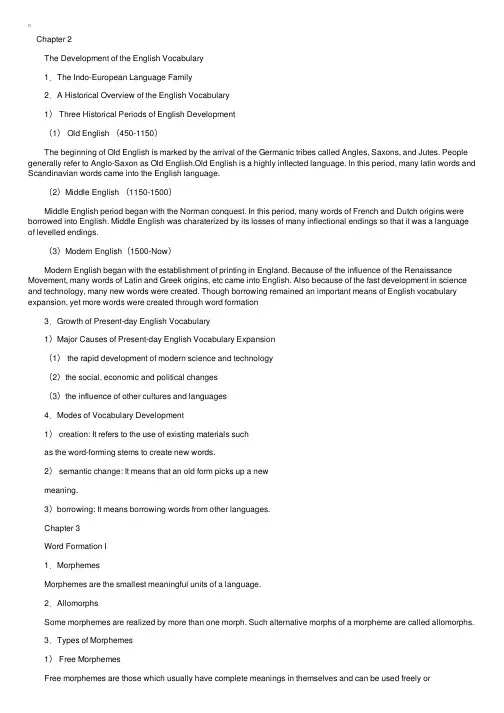
Chapter 2 The Development of the English Vocabulary 1.The Indo-European Language Family 2.A Historical Overview of the English Vocabulary 1) Three Historical Periods of English Development (1) Old English (450-1150) The beginning of Old English is marked by the arrival of the Germanic tribes called Angles, Saxons, and Jutes. People generally refer to Anglo-Saxon as Old English.Old English is a highly inflected language. In this period, many latin words and Scandinavian words came into the English language. (2)Middle English (1150-1500) Middle English period began with the Norman conquest. In this period, many words of French and Dutch origins were borrowed into English. Middle English was charaterized by its losses of many inflectional endings so that it was a language of levelled endings. (3)Modern English(1500-Now) Modern English began with the establishment of printing in England. Because of the influence of the Renaissance Movement, many words of Latin and Greek origins, etc came into English. Also because of the fast development in science and technology, many new words were created. Though borrowing remained an important means of English vocabulary expansion, yet more words were created through word formation 3.Growth of Present-day English Vocabulary 1)Major Causes of Present-day English Vocabulary Expansion (1) the rapid development of modern science and technology (2)the social, economic and political changes (3)the influence of other cultures and languages 4.Modes of Vocabulary Development 1) creation: It refers to the use of existing materials such as the word-forming stems to create new words. 2) semantic change: It means that an old form picks up a new meaning. 3)borrowing: It means borrowing words from other languages. Chapter 3 Word Formation I 1.Morphemes Morphemes are the smallest meaningful units of a language. 2.Allomorphs Some morphemes are realized by more than one morph. Such alternative morphs of a morpheme are called allomorphs. 3.Types of Morphemes 1) Free Morphemes Free morphemes are those which usually have complete meanings in themselves and can be used freely orindependently as words. 2) Bound Morphemes Bound morphemes have to be bound with other morphemes to form words and can not be used independently as words. 3) Free Roots Free roots are free morphemes. They are identical with root words. 4)Bound Roots A bound root, like a free root, is that part of the word that carries the fundamental meaning of a word, but unlike a free root, it is a bound form and has to be bound with other morphemes to form words. 5)Affixes Affixes are forms that are attached to stems to modify meaning or function. Almost all the affixes are bound. 6)Inflectional Affixes An inflectional affix is one attached to the end of a word to convey grammatical meaning or grammatical relation, such as tense, case, number, comparative or superlative degree, etc. 7)Derivational Affixes A derivational affix is one that is added to the beginning or the end of a word in order to create a new word. Derivational affixes can be divided into prefixes and suffixes. 8)Prefixes Prefixes are the morphemes that occur at the beginning of a word. They modify the meaning of a stem, but usually do not change the part of speech of the original word. 9)Suffixes Suffixes occur at the end of stems. Though they can modify the meanings of the original words, their chief function is to change the parts of speech of words. 4.Root and Stem 1) Root A root is the basic form of a word which can not be further analysed without total loss of identity. It carries the main component of the meaning of a word. It can also be defined as that part of a word which remains after all the inflectional and derivational affixes have been removed. 2) Stem A stem can be defined as a any form to which an affix can be added.。
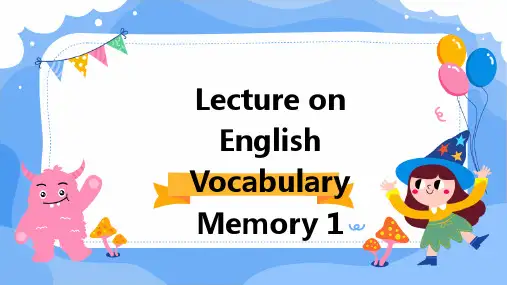
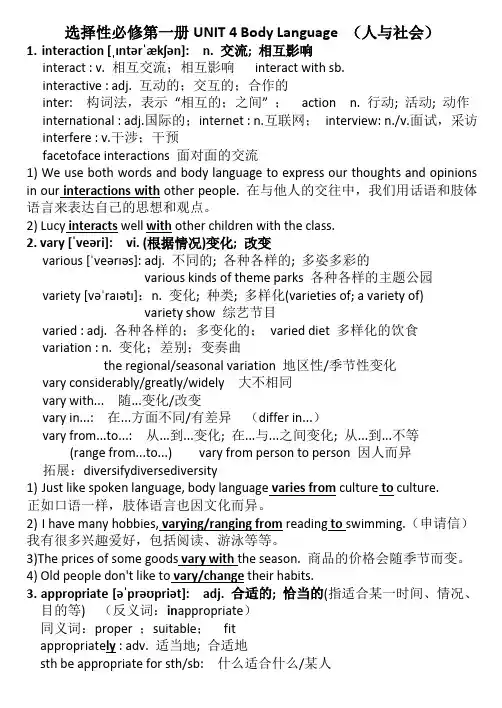
选择性必修第一册UNIT 4 Body Language (人与社会)1.interaction [ˌɪntərˈækʃən]: n. 交流; 相互影响interact : v. 相互交流;相互影响interact with sb.interactive : adj. 互动的;交互的;合作的inter: 构词法,表示“相互的;之间”;action n. 行动; 活动; 动作international : adj.国际的;internet : n.互联网;interview: n./v.面试,采访interfere : v.干涉;干预facetoface interactions 面对面的交流1)We use both words and body language to express our thoughts and opinions in our interactions with other people. 在与他人的交往中,我们用话语和肢体语言来表达自己的思想和观点。
2) Lucy interacts well with other children with the class.2. vary [ˈveəri]: vi. (根据情况)变化; 改变various [ˈveərɪəs]: adj. 不同的; 各种各样的; 多姿多彩的various kinds of theme parks 各种各样的主题公园variety [vəˈraɪətɪ]:n. 变化; 种类; 多样化(varieties of; a variety of)variety show 综艺节目varied : adj. 各种各样的;多变化的;varied diet 多样化的饮食variation : n. 变化;差别;变奏曲the regional/seasonal variation 地区性/季节性变化vary considerably/greatly/widely 大不相同vary with... 随...变化/改变vary in...: 在...方面不同/有差异(differ in...)vary from...to...: 从...到...变化; 在...与...之间变化; 从...到...不等(range from...to...) vary from person to person 因人而异拓展:diversifydiversediversity1)Just like spoken language, body language varies from culture to culture.正如口语一样,肢体语言也因文化而异。
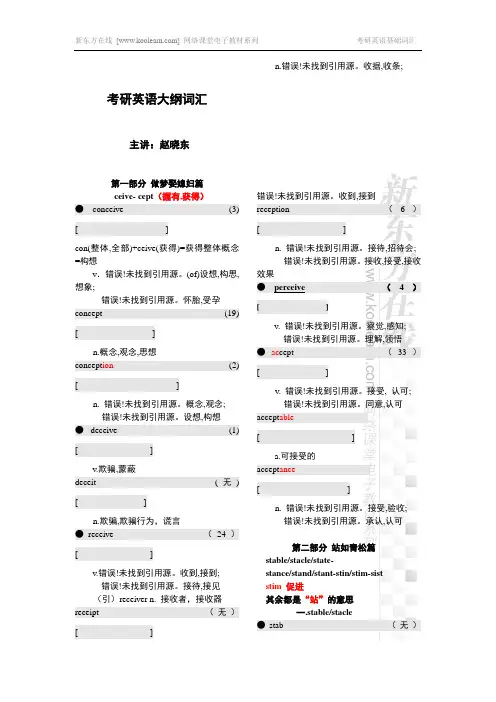
考研英语大纲词汇主讲:赵晓东第一部分做梦娶媳妇篇ceive- cept(握有,获得)●conceive (3) []con(整体,全部)+ceive(获得)=获得整体概念=构想v.错误!未找到引用源。
(of)设想,构思,想象;错误!未找到引用源。
怀胎,受孕concept (19) []n.概念,观念,思想concept ion(2) []n.错误!未找到引用源。
概念,观念;错误!未找到引用源。
设想,构想●deceive (1) []v.欺骗,蒙蔽deceit (无) []n.欺骗,欺骗行为,谎言●receive (24)[]v.错误!未找到引用源。
收到,接到;错误!未找到引用源。
接待,接见(引)receiver n. 接收者,接收器receipt (无)[]n.错误!未找到引用源。
收据,收条; 错误!未找到引用源。
收到,接到reception (6)[]n.错误!未找到引用源。
接待,招待会;错误!未找到引用源。
接收,接受,接收效果●perceive (4)[]v.错误!未找到引用源。
察觉,感知;错误!未找到引用源。
理解,领悟●ac cept (33)[]v.错误!未找到引用源。
接受, 认可;错误!未找到引用源。
同意,认可accept able[]a.可接受的accept ance[]n.错误!未找到引用源。
接受,验收;错误!未找到引用源。
承认,认可第二部分站如青松篇stable/stacle/state-stance/stand/stant-stin/stim-siststim 促进其余都是“站”的意思一.stable/stacle●stab (无)[ s ]v./n.刺,戳stable (8)[]a.稳定的,安定的n.马厩,马棚st ability (3)[]n.稳定,安定in stability (无)[]n.不稳定(性)stadi um(3)[ steidi m]n.运动场,体育场●ob stacle (1)[]n.障碍,妨碍,干扰(to)e stablish (15)[]v.错误!未找到引用源。
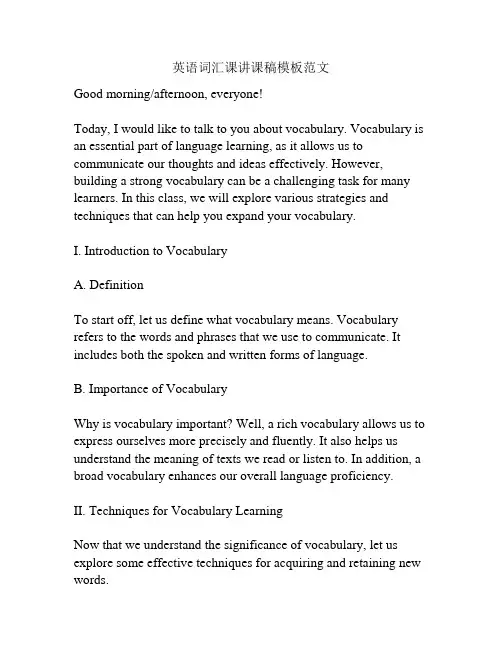
英语词汇课讲课稿模板范文Good morning/afternoon, everyone!Today, I would like to talk to you about vocabulary. Vocabulary is an essential part of language learning, as it allows us to communicate our thoughts and ideas effectively. However, building a strong vocabulary can be a challenging task for many learners. In this class, we will explore various strategies and techniques that can help you expand your vocabulary.I. Introduction to VocabularyA. DefinitionTo start off, let us define what vocabulary means. Vocabulary refers to the words and phrases that we use to communicate. It includes both the spoken and written forms of language.B. Importance of VocabularyWhy is vocabulary important? Well, a rich vocabulary allows us to express ourselves more precisely and fluently. It also helps us understand the meaning of texts we read or listen to. In addition, a broad vocabulary enhances our overall language proficiency.II. Techniques for Vocabulary LearningNow that we understand the significance of vocabulary, let us explore some effective techniques for acquiring and retaining new words.A. Contextual LearningOne of the most effective ways to learn new vocabulary is through context. When we encounter new words in a meaningful context, it helps us understand their meanings and remember them better. Here are a few strategies for contextual learning:1. Reading: Read extensively and regularly in English. Choose materials that are suitable for your level and interests. When you encounter unfamiliar words, try to guess their meanings from the surrounding context.2. Listening: Listen to a variety of English audio materials, such as podcasts, songs, or TED talks. Pay attention to the words used and try to infer their meanings from the context.3. Watching movies or TV shows: Watch English movies or TV shows with subtitles. This will expose you to a wide range of vocabulary and help you understand how words are used in different situations.B. Word FormationWord formation is another effective technique for expanding your vocabulary. By understanding the prefixes, suffixes, and roots of words, you can decipher the meanings of unfamiliar words. Here are some common word formation patterns:1. Prefixes: A prefix is a word part added to the beginning of aword to change its meaning. For example, the prefix "un-" creates an opposite meaning, as in "unhappy" or "undo."2. Suffixes: A suffix is a word part added to the end of a word to change its meaning or form a new word. For example, the suffix "-er" can transform a verb into a noun, as in "teacher" or "baker."3. Roots: A root is the main part of a word that carries its core meaning. By understanding the roots of words, you can easily decipher their meanings. For example, the root "bio-" refers to life, as in "biology" or "biography."C. Vocabulary Games and ActivitiesLearning can be fun! Engaging in vocabulary games and activities can make the process more enjoyable and memorable. Here are some examples:1. Flashcards: Create flashcards with new words and their meanings. Review them regularly to reinforce your memory.2. Word association: Associate new words with something familiar to you. For example, if you are learning the word "jovial," you can associate it with a happy person you know.3. Vocabulary quizzes: Take online quizzes or create your own to test your knowledge of new words. This will help you identify areas that need further improvement.III. Expanding Vocabulary in Different DomainsLastly, let us explore how to expand vocabulary in specific domains or areas of interest. By focusing on the vocabulary related to your areas of interest, you can enhance your language proficiency in those domains.A. Academic VocabularyIf you are a student or planning to pursue higher education, it is important to develop a strong academic vocabulary. This includes words and phrases commonly used in academic writing and speaking. Here are some strategies for expanding your academic vocabulary:1. Reading academic texts: Read journals, research papers, or textbooks in your field of study. Pay attention to the specialized vocabulary used and make note of unfamiliar words.2. Utilizing online resources: Use online resources such as academic word lists or vocabulary websites to learn specific academic words and their usage.3. Participating in academic discussions: Engage in debates, group discussions, or seminars to practice using academic vocabulary in a meaningful context.B. Professional VocabularyIf you are working or planning to enter a specific profession, it is important to develop a strong professional vocabulary. Thisincludes words and phrases commonly used in your field of work. Here are some strategies for expanding your professional vocabulary:1. Industry-specific reading: Read magazines, articles, or blogs related to your profession. Pay attention to the vocabulary used and learn new words relevant to your field.2. Networking: Attend professional events, conferences, or workshops to interact with experts in your field. This will expose you to new vocabulary and terminology.3. Specialized training: Enroll in professional courses or workshops that focus on enhancing your professional vocabulary. This will provide you with practical vocabulary related to your job.IV. ConclusionTo sum up, vocabulary is a crucial component of language learning. By employing strategies such as contextual learning, word formation, and engaging in vocabulary games, you can effectively expand your vocabulary. Furthermore, focusing on specific domains such as academic or professional vocabulary can further enhance your language proficiency. Remember, language learning is a continuous process, so make learning new words a part of your daily routine.Thank you for your attention. If you have any questions or would like further guidance on expanding your vocabulary, please feel free to ask.。


实用英语词汇学1学术意义上的英语词汇学博大精深。
本人拟讲之词汇学定位在实用上,是借用构词法知识,通过文化朔源、近义归纳、来对英文词汇进行组合,使记词2趋向于逻辑记忆与趣味记忆,以达到提高学习效率,扩展词汇的目的。
学习重点3形义相似文化溯源、构词法则。
4学习难点:记词思维的转换5一、构词法记词(一)词根的概念(1)自由根,独立成词able disable unable enable view review preview interview6port import export transportporter portable school scholar scholarship scholasticpair impair repair7clear clarify declare appear apparent transparent(2)粘着根,该类词根必须与其他词缀组合方能成词8vis(看)visit visible vision revise supervisesol(日、太阳)solar insolate son(声音)resonant supersonic unison sonic9lun(月亮)lunar plenilune patr(i)(父亲) patriot expatriatepatroncompatriotmot(动)motion motive10motivationpromoteauto(自,自己)automobile automation automatic11bio(生命)biographybiologybiosphereautobiography tele telecom telescope12telegraphy telegram二、文化组合法对一些单词寻根追源,结合文化背景进行组合13例1:ChristmasChristChristenChristianity14例2:Ever 今义:曾经;古代有永远之意,这一点今天体现在组合词中:evergreen15everlastingforevereverbright例3:Genesis gene genetic 可与圣经故16事创世纪结合例4:man human exhume inhume圣经上讲上帝用泥土造人,human一词中“hum”作为词根有17泥土之意,exhume 从词汇构成上看是ex+hum+e,组合成为基本义是从土中出,引申为挖掘。

英语词汇讲义突破大学词汇WoosirI love new words 我热爱新单词Words are the power of life单词是人生的力量Words express my feelings单词可以表达感情Words express my thoughts单词可以表达思想I love to impress people with amazing words我喜欢用非凡的单词,给人留下深刻印象Words can make my vocabulary a powerful weapon.单词让我的词汇成为有力的武器Words are my key to beautiful English单词是我说漂亮英语的秘诀强烈的信念Every day and in every way, I'm getting better and better.You will never know, what you will get until you try.What pains us trains us.To get ahead, I have to work long hours and take short vacations.I will live every single day with absolute passion.Today is a great day to live life crazily!I live life crazily every day.今天是美好的一天,要疯狂生活!我每天都疯狂地生活。
大量的行动Actions speak louder than words.Practice makes perfect.行动克服恐惧,行动就是力量!坚持Nothing in the world can take the place of persistence.词汇的重要性:大厦的基石;口语、阅读、听力、作文人在什么情况下记忆力好?七分饱;兴奋状态;睡觉之前;及时复习,不同场合出现7次以上。
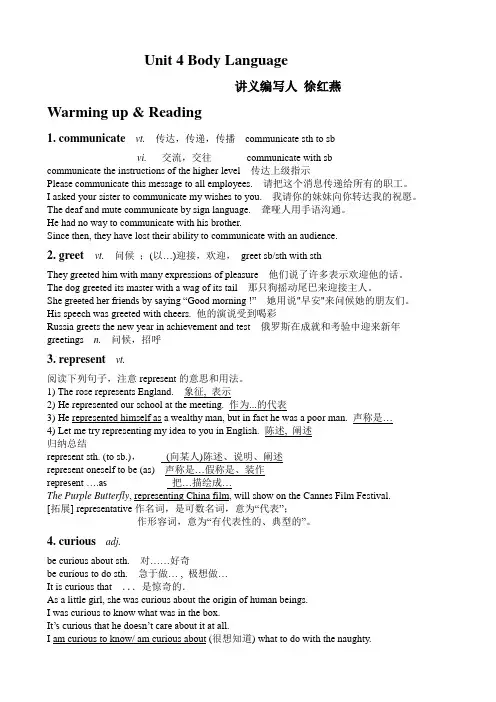
Unit 4 Body Language讲义编写人徐红燕Warming up & Reading1. communicate vt.传达,传递,传播communicate sth to sbvi.交流,交往communicate with sbcommunicate the instructions of the higher level 传达上级指示Please communicate this message to all employees. 请把这个消息传递给所有的职工。
I asked your sister to communicate my wishes to you. 我请你的妹妹向你转达我的祝愿。
The deaf and mute communicate by sign language. 聋哑人用手语沟通。
He had no way to communicate with his brother.Since then, they have lost their ability to communicate with an audience.2. greet vt.问候;(以…)迎接,欢迎,greet sb/sth with sthThey greeted him with many expressions of pleasure 他们说了许多表示欢迎他的话。
The dog greeted its master with a wag of its tail 那只狗摇动尾巴来迎接主人。
She greeted her friends by saying “Good morning !”她用说"早安"来问候她的朋友们。
His speech was greeted with cheers. 他的演说受到喝彩Russia greets the new year in achievement and test 俄罗斯在成就和考验中迎来新年greetings n.问候,招呼3. represent vt.阅读下列句子,注意represent的意思和用法。
李辉老师全网唯一亲自答疑QQ:1375169808微博:@小辉辉老师2017李辉老师全年旗舰版词汇补充课程讲义【讲义内容】本讲义涵盖词汇课1-24篇文章的详细讲解。
每篇文章包含“原文回顾”和“辉常精读”两个部分。
“原文回顾”是这篇高考真题文章的原文;“辉常精读”是辉哥课上的讲解,包括“查单词”、“画括号”、“做直译”、“标主题”等四个动作。
【使用方法】Step1:自己在“原文回顾”上用铅笔画括号,遇见不认识的单词,可以查阅“辉常精读”里的单词注释。
争取靠自己的努力读懂文章。
Step2:听辉哥的课程讲解,彻底看懂这篇文章;同时,将你画的括号和辉哥做比较,不懂的地方可以找辉哥问。
Step3:反复聆听辉哥的课后录音、反复朗读这篇文章、反复背辉哥讲解的单词,直到彻底掌握这24篇文章中的知识。
【学习效果】通过深入学习24篇文章,真正掌握画括号的方法,同时增加1500左右的高频核心单词!建议1-2天学1篇,40天内拿下这12篇文章!【辉哥建议】把这份讲义完整打印下来,单词右边的空白处用来反复抄写单词,以尽量熟悉每个单词的拼写。
【自学更多】请按以下步骤,自学更多文章,不断积累单词:Step1.遇到生词Step2.查手机字典Step3.听一下读音Step4.抄到本子上Step5.反复背这个单词Step6.反复读这篇文章(以上步骤超级清楚、明确,只要照做,词汇量必有飞速提升!)Passage12014浙江卷A篇【原文回顾】Wealth starts with a goal saving a dollar at a time.Call it the piggy bank strategy(策略).There are lessons in that time-honored coin-saving container.Any huge task seems easier when reduced to baby steps.I f you wished to climb a12,000-foot mountain, and could do it a day at a time,you would only have to climb33feet daily to reach the top in a year.If you want to take a really nice trip in10years for a special occasion,to collect the$15,000cost,you have to save $3.93a day.If you drop that into a piggy bank and then once a year put$1,434in a savings account at1% interest rate after-tax,you will have your trip money.When I was a child,my parents gave me a piggy bank to teach me that,if I wanted something,I should save money to buy it.We associate piggy banks with children,but in many countries,the little containers are also popular with adults.Europeans see a piggy bank as a sign of good fortune and wealth.Around the world,many believe a gift of a piggy bank on New Year’s Day brings good luck and financial success.Ah, but you have to put something in it.Why is a pig used as a symbol of saving?Why not an elephant bank,which is bigger and holds more coins?In the Middle Ages,before modern banking and credit instruments,people saved money at home,a few coins at a time dropped into a jar or dish.Potters(制陶工)made these inexpensive containers from an orange-colored clay(黏土)called“pygg,”and folks saved coins in pygg jars.The Middle English word for pig was“pigge”.While the Saxons pronounced pygg,referring to the clay,as“pug”,eventually the two words changed into the same pronunciation,sounding the“i”as in pig or piggy.As the word became less associated with the orange clay and more with the animal,a clever potter fashioned a pygg jar in the shape of a pig,delighting children and adults.The piggy bank was born.Originally you had to break the bank to get to the money,bringing in a sense of seriousness into savings. While piggy banks teach children the wisdom of saving,adults often need to relearn childhood lessons. Think about the things in life that require large amounts of money---college education,weddings,cars, medical care,starting a business,buying a home,and fun stuff like great trips.So when you have money, take off the top10%,put it aside,save and invest wisely.【辉常精读】wealth财富n.health健康n.goal目标n.进球v.save存v.dollar美元n.(可数)money钱n.(不可数)bank银行,河岸n.strategy策略n.honor荣耀n.coin硬币n.contain包含v.container容器n.Wealth starts(with a goal)(saving a dollar)(at a time).Call it the piggy bank strategy(策略).There are lessons(in that time-honored coin-saving container).财富开始/伴随着一个目标/存1美元/在一次。
英语基础语法知识讲座英语基础语法知识第一讲名词一、名词的可数与不可数1、个体名词是可数名词,有些集体名词为不可数名词,如poem---poetry、machine(机器)---machinery、weapon(武器)---weaponry 、coat---clothing、table---furniture(家具)、bag---luggage(行李)、article---merchandise(商品)等词前者为个体名词,后者为集体名词做主语谓用单;person---people、policeman---police、clergyman---clergy(牧师)、cow(ox)---cattle、duck (hen,chicken,cock)---poultry等词前者为个体名词,后者为集体名词做主语谓用复。
有些有生命的集体名词如audience(观众)、class、couple、crew、family、committee(委员会)、offspring(子孙)等作主语强调整体时谓单,强调其成员时谓用复。
如:The audience is requested to keep silent. 要求观众保持安静。
The audience are all old people. 观众尽是些老人。
My family are all teachers.2、物质表物质为不可数,但有许多物质名词既可表物质有可表个体事物。
如:rabbit (兔肉/兔子)、lamb(羊肉/羊羔)、chicken (鸡肉/小鸡)、iron(熨斗/铁)、potato(土豆/土豆泥)、egg (鸡蛋/蛋渍)rubber(胶鞋/橡胶)glass(眼镜/玻璃)等。
表个体时为可数名词。
I found 3 hairs in her book …3根头发…。
The boy threw two eggs at the old man, so there was much egg on his clothes.许多抽象名词为不可数,如advice、work(工作),有些则为可数,如meeting、opinion。
第1讲方法概述:短期记忆、长期记忆第2讲词汇记忆:一词多义、词性转化第3讲词汇记忆:词义引申第4讲词汇记忆:谐音法、拆分法第5讲词汇记忆:比对法(1)第6讲词汇记忆:比对法(2)第7讲词根记忆:音译谐音之spis, spect第8讲词根记忆:音译谐音之cid, cis第9讲词根记忆:音译谐音之tract,stract,string,strict 第10讲词根记忆:音译谐音之band,bond,bind第11讲词根记忆:音译谐音之log; fend第12讲词根记忆:根词借义之man,minis第13讲词根记忆:根词借义之cap,cup,cip第14讲词根记忆:摘取字母之spir第15讲词根记忆:摘取字母之vis,vid第16讲词根记忆:摘取字母之press;mov,mot,mob第17讲词根记忆:摘取字母之pos, pon第18讲词根记忆:摘取字母之clos,clud; voc,vok第19讲词根记忆:糅合造词之tain,ten第20讲词根记忆:词根比对之audi;dict第21讲词根记忆:词源故事之fess; rupt第22讲词根记忆:词源故事之graph,gram; scribe,script 第23讲词根记忆:词源故事之ceed,cede,cess第23讲词根记忆:词源故事之gress,grad第25讲超纲词第26讲词缀汇总第1讲方法概述一短期记忆1 音:Susan六句魔音元音发音不受阻,音节要以元音计;重在词末汉四声,其他位置汉一声;如无重音汉轻声,两点注意要记清eg.: superstition [ˌsu:pəˈstɪʃn]portray [pɔ:ˈtreɪ]hypocrisy [hɪˈpɒkrəsi]innumerable [ɪˈnju:m ər əbl]renaissance [r ɪˈne ɪsns]两点注意:(1) 只有一个音节的单词读作汉语四声(2) 两个单音节单词组合而成的复合词,部分读一声或四声,部分读轻声eg.:preach [pri:t ʃ]update [ˌʌp ˈde ɪt]football [ˈfʊtb ɔ:l]练习:sack [sæk]safeguard [ˈseɪfg ɑ:d]wholesome [ˈhəʊls əm]2形3义二 长期记忆六轮记忆法:1:Day 1 晚上复习当天记忆的词汇2:Day 2 早晨3:Day 6 早晨或晚上4:Day 16 早晨或晚上5:Day 46 早晨或晚上6:Day 106 早晨或晚上注意:(1)(2)(3)第2讲 词汇记忆:一词多义、词性转化 一 一词多义1 beareg.: ○1bear and forbear○2The tree bears well.○3bear the weight of the roof2 pupil3 springeg.: Then beverage companies started bottling the production of far-off springs, and now office workers unthinkingly sip bottled water all day long.4 sow5 novel6 soundeg.: ○1A sound mind is in a sound body.○2They have got home safe and sound.○3His argument is basically sound.○4There are possible risks, but nonetheless, we feel it's a sound investment.○5With heavy rain falling all night, she had a sound sleep.7 tear8 minute9 bound10 concreteeg.:Many Americans regard the jury system as a concrete expression of crucial democratic values…11 skyeg.: If the sky, and the share price, is falling, outside directors should be able to give advice based on having weathered their own crises.12 weathereg.: If the sky, and the share price, is falling, outside directors should be able to give advice based on having weathered their own crises.13 countereg.: ○1These habits have helped companies earn billions of dollars when customers eat snacks or wipe counters almost without thinking, often in response to a carefully designed set of daily cues.○2I do n’t like quotas either; they run counter to my belief in meritocracy, governance by the capable.○3Compared with their American counterparts, Japanese newspapers are much more stable…14 doctoreg.: …that is, the participants who thought the most positively doctored picture were real…15 communityeg.: Jurors should be selected randomly from a representative cross section of the community.二词性转化1 名词转为动词(1)foolorphancashpile(2)shipmailtelegram(3)bottlegaragecagelist(4)financeshelterfuelman(5)peeljuicedustskin(6)handshoulder2形容词转为动词(1)barefreehumble(2)warmdrynarrow(3)braverough3动词转为名词(1)translatorcoachcook(2)rejectimportcatch(3)curecover(4)dumpretreatdivide第3讲词汇记忆:词义引申 一 形状引申winghaircranecup二 比喻引申Edenapplebabeduck三 功能引申blanketscreeneg.: If we know female job screeners are more likely to reject attractive female applicants, we can help screeners understand their biases—or hire outside screeners.nursecapeg.: The Fuji mountain was capped with snow.四 抽象引申eyeeg.: He has an eye for the beautiful scenery.nerveeg.: How did he have the nerve to say that?mothereg.: Caution is mother of security.五 具体引申casejudgeaccountdeficiency第4讲词汇记忆:谐音法、拆分法一 谐音法1外来词sofa n.cool a.bar n.golf n.ballet n.card n.romance n.logic n.typhoon n. microphone n. hamburger n. salad n.brandy n.whisky / whiskey n. engine n.copy v.cartoon n.laser n.2 汉英对照bowl n.carve v.cut v.cheat v.dawn n.debt n.deliver v.delivery n.dip v.drag v.fatigue n.float v.govern n.government n. governor n. harmony n. horn n.howl v.ink v. /n. mould / mold n. mode n. luggage n.lug v.lure v.kin n.pan n.panel n. pave v.peel v. random a. route n.rude a. saint a. similar a. search v.shark n.sour a.sow v.sting v.temple n.tremble v.tie n.tomb n.tower n.tow v3 普通词汇 ambition n.awkward a.damn v.diamond n.drastic a.drug n.famine n.fertile a.glamor n.grant v.lame a.loyal a.naughty a.spoil v.stretch v.toss v.pest n.二 拆分法together adv.heroin n.heroine n.innocent a.incentive n.cargo n.inform v.copyright n.第5讲词汇记忆:比对法(1) 1 food —feed2 bread —breed3 bottle —butler4 sit —site —settle —setteesettle witheg.:○1You may settle with your friend.○2It’s time for me to settle with you.settle ineg.: The ABC hopes to settle in China.5 metal —medal6 ball —bail —pail7 arm —harm8 arduous —hard9 board —overboard —aboard —border—broad —abroad10 idea—ideal—idol—idle—idyleg.: ○1driven by the flow of work, money and ideas○2democratic ideals11 boom —doom —loom —gloom —groom —broom —deem —self-esteemeg.: ○1boom and bust○2chronicle one’s own doom○3be doomed to12 care v.core n.cure v.corn n.scorn v.scornful a.cereal n.cord n.cordless a.chord n.cordial a.courage n.discourage v.encourage v.decorate v.accord v.discord v.第6讲词汇记忆:比对法(2) 1 argument —augmentaugmentationauctionauctioneer2 derive —depriveeg.:○1derive pleasure from helping others○2deprive sb. of his political rights for life3 judge v./n.eg.:○1Don’t judge a book by its cover.○2Let me be the judge of that.○3It’not for you to judge.judgement /judgment n.judicial a.prejudice n.jury n.juror n.just n.justice n.justify v.4 acquire—inquire—requireeg.:○1Higher pleasures do require cultivation and appreciation and education. ○2“Why are you here again?" she inquired.5 sequence—subsequent—consequence6 personal—personalized—impersonal—interpersonal —personalityeg.:○1I need your advice on a personal matter, but it's not about me.○2An economic disaster was as impersonal as an earthquake.○3He is one of the best-known personalities in the world of tennis.7 pull—compel—pulse—impulse—expel—repel—rebel—propel——appealeg.:○1Susan is a fast thinker, and she acts on impulse.○2The headmaster decided to make an example of the pupil and expel him from the school. ○3The expelled man repelled billions of rebellions.○4He's a person propelled by ambition.第7讲词根记忆:音译谐音之spis, spect1spectexpect v.unexpected a.expectation n.expectancy n.eg.:○1Expectation is better than realization.○2She waited for her lover in a state of happy expectancy.○3life expectancyinspect v.eg.:It was strange that nobody inspected my ticket before I got on the train.inspector n.eg.:○1quality inspector○2Our building inspector has warned me that the ceiling might collapse if I put more books in the attic.inspection n.eg.:○1Inspection is cordially invited.○2Our exports have to pass a rigid inspection before they are shipped.respect v.eg.: My argument is different from yours in one crucial respect.with respect toeg.: It's going to raise a lot of problems with respect to environmental pollution.respectful a.respectable a.respective a.eg.: The laws apply to everyone irrespective of race, color, or creed.aspect n.eg.:○1You should consider all aspects of your decision, negative as well as positive.○2China's industry is assuming a new aspect.prospect n.eg.:○1The prospect from the balcony was breathtaking.○2John is in high spirits at the prospects.○3They went there to prospect for gold .prospective a.eg.:○1She is his prospective mother-in-law.○2prospective results in the experimentretrospect v.retrospection n.eg.: Master Zeng said,“Self-introspection should be practiced on a daily basis.”retrospective n.in retrospecteg.:○1In retrospect, it's easy to see why we were wrong.○2Raising a child can bring happiness in retrospect.suspect v.eg.:○1a romantic thriller about a cop who falls in love with a prime suspect in a murder case ○2I suspect that he has stolen my watch.○3I doubt that he has stolen my watch.suspected a.suspection n.perspective n.eg.: from a historical perspectivefrom my perspectivefrom the middle-class family perspectivespectate v.eg.: I cannot believe that anyone should want to spectate the ordinariness of my existence, for I certainly have no wish to spectate anyone else's.spectator n.speculate v.eg.:○1She often speculated as to what sort of man she would marry.○2It's dangerous to speculate.speculator n.speculation n.speculative a.spectacle n.eg.:○1She was a spectacle, sure enough.○2The children took in the spectacle open-mouthed.specular a.eg.: We watched a spectacular sunset at the beach.specularly adv.spectrum n.2 spicsuspicious a.be suspicious of =suspecteg.:○1Some women secretly inspect their husbands’cell phones, looking for suspicious messages when they suspect their husbands have extra-marital affairs.conspicuous a.eg.: Notices shall be put in conspicuous places.3 spisdespise v.eg.: People always pretend to despise those they don’t have.第8讲词根记忆:音译谐音之cid, cis1 ciddecide v.decision n.decisive a.accident n.incident n.eg.:One particular incident sticks in my mind.incidence n.incidental a.incidentally adv.eg.:The information was only discovered incidentally. coincide v.eg.:It’s a pity that our trips to New York don’t coincide. coincident a.coincidence n.occident n.suicide n.homicide n.feticide n.patricide n.matricide v.pesticide/insecticide n.herbicide n.2 cisscissors n.precise a.precisely adv.precision n.concise a.concision n.incise v.incisive a.assassinate v. assassination n. excise v. excision n.。
英语词汇讲课稿范文Ladies and gentlemen,Today, I am here to present to you a comprehensive discussion on vocabulary building in the English language. Without further ado, let's delve into the exciting world of words and their meanings.Firstly, it is imperative to understand the importance of an extensive vocabulary. Possessing a wide range of words allows us to express ourselves more accurately, communicate effectively, and comprehend a variety of texts. Whether it is reading literature, writing an essay, or engaging in a conversation, vocabulary plays a crucial role in our language development.Now, let's move on to various strategies that can be employed to build our vocabulary. One approach is to read extensively. By reading books, newspapers, and articles, we expose ourselves to different writing styles, genres, and topics, thereby encountering new words and their meanings. It is crucial to maintain a habit of reading regularly to expand our vocabulary consistently. Another effective method to enhance our word power is by using flashcards. Writing down new words on flashcards, along with their definitions, and revising them regularly can aid in retaining these words in our memory. Flashcards can be easily carried with you and reviewed during idle moments, ensuring a constant learning process.Visual aids, such as pictures and diagrams, also play a significant role in vocabulary acquisition. Associating words with relevantimages helps in forming a stronger connection in our minds. Additionally, using these visuals in real-life contexts can help us understand and retain words more effectively.Contextual learning is another valuable way to build vocabulary. Paying attention to the words used in various situations and observing how they are used can provide us with a deeper understanding. For instance, watching movies and TV shows or engaging in conversations with native English speakers can expose us to different contexts and enable us to expand our vocabulary naturally.Furthermore, technology can be a great ally in the quest for a rich vocabulary. Numerous language-learning apps and websites offer interactive exercises, quizzes, and games to help us expand our word power. These platforms provide an engaging and fun way to learn and retain new words while also tracking our progress.Lastly, it is essential to develop a habit of using new words in our daily conversations and writing. Applying new vocabulary actively reinforces our learning, encourages creativity, and enhances our ability to express ourselves more precisely. By making a conscious effort to incorporate new words into our language usage, we solidify our understanding and ensure continued growth.In conclusion, vocabulary building is an ongoing process that requires dedication and practice. By utilizing various strategies such as reading extensively, using flashcards, incorporating visual aids, learning from different contexts, leveraging technology, and applying new words actively, we can successfully expand our wordpower and become more effective communicators.Thank you for your attention, and I hope you find these insights beneficial in your journey to enhance your English vocabulary.。
新东方刘畅词汇讲义1,自我介绍2,学习词汇注意的问题单词的英文解释和例句2, 单词的熟词生意.3,单词的发音3, 词汇的学习方法一形象化记忆词汇的方法人们对于图像的存储速度要远远高于对于语言符号的存储速度。
把这个理论应用到单词的记忆上,就可以把枯燥的单词转变成一幅幅生动的画面。
我们这里首先举几个例子:(1)chill (2)image (3) spark (4)snowflake (5)trail(6) isolate如果把所有形象记单词的方法总结到一起,可以用六句口诀来概括,叫做一读,二拼,三变形,四拆,五分,六开屏。
‘一读’,就是所谓的谐音,就是根据读音联想到单词的意思。
‘二拼’就是利用汉语拼音来记单词。
‘三变形’,很多单词并不是那么规整,需要进行简单的变形,‘四拆’,就是把单词拆分成两个或更多个有效的部分。
‘五分’:很多单词去掉一个或两个字母,成为你认识的单词,就要用五分的方法。
‘六开屏’以上的方法都是通过短单词来记忆长单词,但有的时候,也可以通过你所熟悉的长单词来记忆你不熟悉的短单词。
组记:Pie-lie- tie-dieGeneral-generate-geniusCar- scar- scarf-scarletMug –smug-smuggle二、词根词缀记单词辨别单词例一The radio can _____ signalsA transmitB emit例二词根turb=stir搅动dis=away离开per=through从头到尾(2)统一单词的很多含义1,compose2, confess(3)词源log;calciumcarbarderive。
(4)扩充词汇progress,regress,congress,aggressive,egress,reputation,put,computer,dispute 三,词根词缀与形象化相结合1,duce=leadcide=cutlect=speakdilemma四,生活中学英文1,单词2,短语3,句子五、词根词缀第一小节bibliographybiblio=biblebibliomaniagraph=writeparagraphpara 在旁边parasite(场所,地点)寄生虫telegraph tele 远程telescopetelevisiontelephoneautobiographyautomobileport=carryautomaticauto-alarmauto-criticismautonomybio=lifebiologybiochemistry第二节muse 表示艺术家创作的灵感MusicMusicalmuseumstadiumforumvacuum vac=vacu,empty vacantauditoriumamuse v. 1,使娱乐消遣2,逗乐Amusing adj. 有趣的,使人发笑的Amusement n. 娱乐,娱乐活动Entertain(enter+tain:keep) v. 1,使娱乐,使快乐2,招待,款待Entertainment n. 1,娱乐2,款待RecreationMusician=music+ian(人)第三节小新: 你怎么了, ,(摸广志的头),呜,好烫,好象被人煮了,广志: 神经,我生病了.I got sick小新: 生病?呜,会死吗?广志: 会,会被你气死. 我只是咳嗽, (kekekeke) cough, 你懂吗?小新:我懂,但凡大的疾病都会有前兆的,首先使headache 头疼,然后是小的疾病,ailment,它的动词, ail表示生小的疾病.这个词的读音特别象爸爸哼哼的声音’哎呦”然后是咳嗽,就是爸爸现在的阶段,接下来可以转化成传染性的疾病infectious disease,到了那个时候胸部会有锣音,痰中会有血,成为一名正式的非典病人,然后抢救,再抢救……. 再以后…….爸爸,你要是死了,32年的房屋贷款谁来换呢?广志: 当然是有由小新来还了,不过我可能只是得了流感flu,不碍事的.小新: (自语:32年的房屋贷款),爸爸,我很爱你,你不能死,我带你去医院看病吧.广志; 乖儿子,我们走.(词汇博士: sick Are you sick?Are you well. Are you Ok?Ail –ailing-Ailment)Infectious-PerfectDisinfecteddisease=dis+ease广志: 小新,给我挂个急诊小新: 急诊? 呜,我知道,就是急性麻疹.广志:(伸手一指)小新,不懂不要乱说,你看那边,急诊就是emergency case,紧急就诊,傍边就是注射室injecting room,就是扎针的地方。